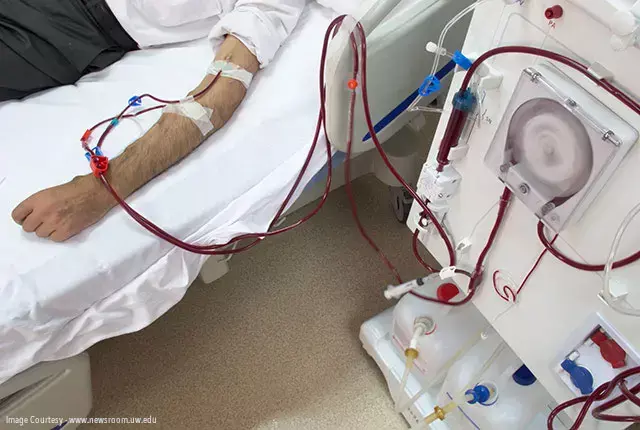- Home
- Medical news & Guidelines
- Anesthesiology
- Cardiology and CTVS
- Critical Care
- Dentistry
- Dermatology
- Diabetes and Endocrinology
- ENT
- Gastroenterology
- Medicine
- Nephrology
- Neurology
- Obstretics-Gynaecology
- Oncology
- Ophthalmology
- Orthopaedics
- Pediatrics-Neonatology
- Psychiatry
- Pulmonology
- Radiology
- Surgery
- Urology
- Laboratory Medicine
- Diet
- Nursing
- Paramedical
- Physiotherapy
- Health news
- Fact Check
- Bone Health Fact Check
- Brain Health Fact Check
- Cancer Related Fact Check
- Child Care Fact Check
- Dental and oral health fact check
- Diabetes and metabolic health fact check
- Diet and Nutrition Fact Check
- Eye and ENT Care Fact Check
- Fitness fact check
- Gut health fact check
- Heart health fact check
- Kidney health fact check
- Medical education fact check
- Men's health fact check
- Respiratory fact check
- Skin and hair care fact check
- Vaccine and Immunization fact check
- Women's health fact check
- AYUSH
- State News
- Andaman and Nicobar Islands
- Andhra Pradesh
- Arunachal Pradesh
- Assam
- Bihar
- Chandigarh
- Chattisgarh
- Dadra and Nagar Haveli
- Daman and Diu
- Delhi
- Goa
- Gujarat
- Haryana
- Himachal Pradesh
- Jammu & Kashmir
- Jharkhand
- Karnataka
- Kerala
- Ladakh
- Lakshadweep
- Madhya Pradesh
- Maharashtra
- Manipur
- Meghalaya
- Mizoram
- Nagaland
- Odisha
- Puducherry
- Punjab
- Rajasthan
- Sikkim
- Tamil Nadu
- Telangana
- Tripura
- Uttar Pradesh
- Uttrakhand
- West Bengal
- Medical Education
- Industry
Erythropoietin Resistance Index helps predict mortality in CKD patients

A recent study published in the Renal Failure found the intricate relationship between anemia, chronic kidney disease (CKD) and mortality risks in patients undergoing maintenance hemodialysis (MHD). The study was conducted using data from the China Dialysis Outcomes and Practice Patterns Study (DOPPS) 5. This focused on investigating the factors influencing the erythropoietin resistance index (ERI) and its correlation with survival outcomes.
This study encompassed a total of 1270 MHD subjects with an average age of 60 and discovered a critical link between ERI and mortality. ERI which is calculated as ESA (erythropoiesis-stimulating agents) dosage per week divided by weight post-dialysis and hemoglobin levels emerged as a potential predictor of all-cause mortality. The subjects were divided into two groups based on the median ERI of 14.03.
Multivariate logistic regression analyses uncovered several factors negatively associated with high ERI baseline including dialysis vintage, white blood cell count, use of high flux dialyzer, body mass index, gender, and albumin levels by underscoring the complexity of ERI dynamics.
During the follow-up period, 13.9% of the subjects, including 89 deaths attributed to cardiac/vascular causes, were reported. Cox regression analysis further demonstrated a positive association between ERI and all-cause mortality, particularly in specific subgroups.
The findings underscore the significance of monitoring ERI levels by indicating a potential avenue for predicting mortality risk in MHD patients. This insight could prompt a potential shift in patient care with the need for increased attention and tailored interventions for those with elevated ERI. The findings of this study brings us one step closer to personalized healthcare strategies by equipping medical community with tools to anticipate and mitigate risks for their patients battling chronic kidney disease.
Source:
Zhao, X., Gan, L., Hou, F. F., Liang, X., Chen, X., Chen, Y., Ni, Z., & Zuo, L. (2024). The influencing factors of the erythropoietin resistance index and its association with all-cause mortality in maintenance hemodialysis patients. Renal Failure, 46(1). https://doi.org/10.1080/0886022x.2023.2290922
Neuroscience Masters graduate
Jacinthlyn Sylvia, a Neuroscience Master's graduate from Chennai has worked extensively in deciphering the neurobiology of cognition and motor control in aging. She also has spread-out exposure to Neurosurgery from her Bachelor’s. She is currently involved in active Neuro-Oncology research. She is an upcoming neuroscientist with a fiery passion for writing. Her news cover at Medical Dialogues feature recent discoveries and updates from the healthcare and biomedical research fields. She can be reached at editorial@medicaldialogues.in
Dr Kamal Kant Kohli-MBBS, DTCD- a chest specialist with more than 30 years of practice and a flair for writing clinical articles, Dr Kamal Kant Kohli joined Medical Dialogues as a Chief Editor of Medical News. Besides writing articles, as an editor, he proofreads and verifies all the medical content published on Medical Dialogues including those coming from journals, studies,medical conferences,guidelines etc. Email: drkohli@medicaldialogues.in. Contact no. 011-43720751


